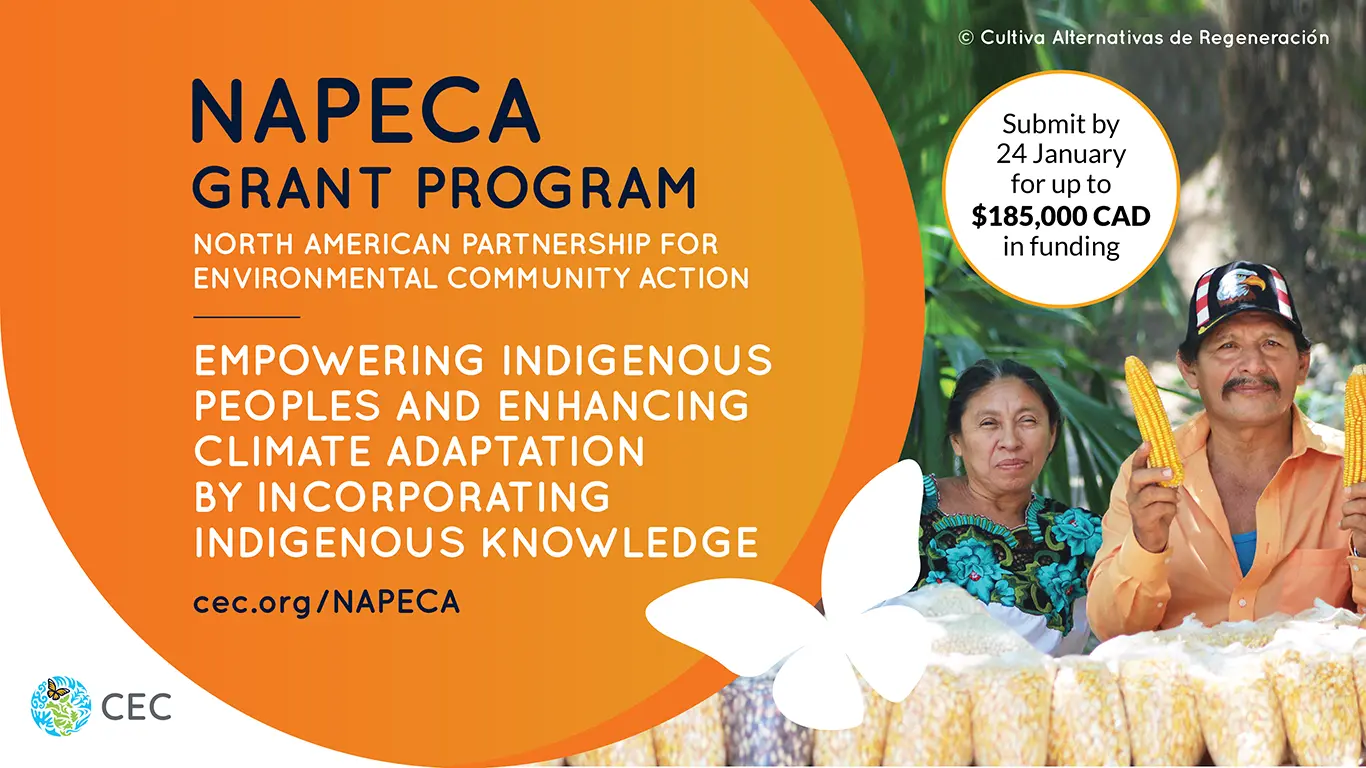NAPECA Grant Program: C$1.75 Million to Empower Indigenous Peoples and Enhance Climate Adaptation by Incorporating Indigenous Knowledge
Tiohtià:ke (Montreal), 27 November 2023 — The Commission for Environmental Cooperation (CEC) is calling for applications for the new cycle of the North American Partnership for Environmental Community Action (NAPECA) grant program. This year’s call for proposals is aimed at organizations supporting environmental initiatives that will involve and empower Indigenous Peoples and communities and enhance climate adaptation by respectfully applying and protecting Indigenous knowledge systems.
The CEC recognizes the importance of working with Indigenous Peoples and communities—the original guardians and caretakers of territories in Canada, Mexico and the United States and whose environmental knowledge and practices, and unique perspectives are increasingly recognized, both at local and international levels, in many places today.
The 2024–2026 NAPECA grant cycle will support projects and partnerships that are led by or promote the active participation of Indigenous governments, organizations, communities and individuals, in full recognition of Indigenous rights and the importance of Indigenous Knowledge in environmental decision-making, including climate adaptation.
Information on the application process and the selection criteria are available in the call for proposals. The deadline for submitting proposals is 24 January 2024 (5:00 p.m. EST) and projects will begin in June 2024.
The CEC encourages applicants to submit proposals up to C$185,000. Eligible applicants are tribal nations, Indigenous Peoples and communities, entities which are incorporated as non-profit organizations, and academia in Canada, Mexico or the United States. There is no requirement that the proposed project necessarily be implemented in Indigenous communities. Rather, the requirement is that the project be implemented in collaboration and partnership with one or more Indigenous partners.
Eligible projects could address topics such as:
- the sustainable use of biodiversity and ecosystems through Indigenous knowledge systems and practices
- reducing habitat loss to conserve biodiversity and land
- strengthening climate action to achieve a low-carbon emission economy (considering scientific, technical and Indigenous Knowledge)
- improving air quality
- improving community support networks for times of crisis
- implementing nature-based solutions
Priority will be given to long-term environmental solutions that can demonstrate, through qualitative and/or quantitative indicators, a direct impact on communities, their well-being and health, their territories and capacities to address and adapt to the impacts of climate change.
To apply for the NAPECA grant program, get more information, or learn about previous grant recipients, please visit www.cec.org/napeca.
For any questions, please contact napeca@cec.org.
If you would like to know more about CEC initiatives, you can sign up for our newsletter and follow us on social media.

About the CEC
The Commission for Environmental Cooperation (CEC) was established in 1994 by the governments of Canada, Mexico and the United States through the North American Agreement on Environmental Cooperation, a parallel environmental agreement to NAFTA. As of 2020, the CEC is recognized and maintained by the Environmental Cooperation Agreement, in parallel with the new Free Trade Agreement of North America. The CEC brings together a wide range of stakeholders, including the general public, Indigenous people, youth, nongovernmental organizations, academia, and the business sector, to seek solutions to protect North America’s shared environment while supporting sustainable development for the benefit of present and future generations
The CEC is governed and funded equally by the Government of Canada through Environment and Climate Change Canada, the Government of the United States of Mexico through the Secretaría de Medio Ambiente y Recursos Naturales, and the Government of the United States of America through the Environmental Protection Agency.